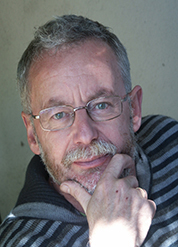Dispersal is a key feature in population biology, central to areas as important and diverse as population dynamics, population genetics, life-history theory and breeding-system evolution. Animal movement among discrete localities affects local extinction risks, competition patterns, gene frequencies, inbreeding, kin structure and potential for cooperation, among many other aspects.
We are investigating dispersal along several lines:
Empirical Field Work
Empirical field work is conducted to document the role of dispersal on the dynamics and genetics of spatially-structured populations. The model organism is the greater white-toothed shrew, Crocidura russula, a small insectivorous mammal widespread in Southern and Central Europe. C.russula lives in small breeding groups of a few monogamous pairs, interconnected by restricted female dispersal (neighboring males are related at the half-sib level). Specific genetic markers were developed to document the apportionment of genetic variance within and among local populations, and to investigate kin structures and individual interactions. We are now trying to develop male-specific microsatellites (Y-chromosome) in order to better assign paternities and quantify the effect of male philopatry on population structure. Other questions currently addressed concern the cost and possible avoidance of inbreeding, as well as the consequences of this shrew's breeding system on its effective population sizes. Relevant publications: Favre et al. 1997 (PDF), Balloux et al. 1998 (PDF), Bouteiller & Perrin 2000 (PDF), Ehinger et al. (PDF), Duarte et al. (PDF), Fontanillas et al. (MS)
Statistical Methods
Statistical tests are developed, coupled with computer simulations, designed to allow better inferences from genetic data on breeding-system parameters. We recently focused on the possibility to test for a sex-bias in dispersal based on sex-differences in F-statistics or assignment indices (Goudet et al 2002), we evaluated the effect of mating system on effective population size (Kaeuffer et al. 2004) and we developed methods to quantify sex-specific dispersal in hierarchically structured populations, based on autosomal markers (Fontanillas et al.2004). Relevant publications: Basset et al. 2000 (PDF), Goudet et al. 2002 (PDF), Kaeuffer et al 2004 (pdf), Fontanillas et al 2004 (pdf)
Dispersal Evolution
Evolution of dispersal is investigated using game theory (through ESS modeling) and numerical simulations (through individually-based and genetically explicit modeling). Present focus is on the evolution of sex-biased dispersal under selective pressures from inbreeding avoidance, local competition (be it for mates or resources) under different mating regimes, and kin cooperation (under varying recognition mechanisms). Relevant publications: Perrin & Mazalov 1999 (PDF), Perrin & Mazalov 2000 (PDF), Perrin & Goudet 2000 (Abstract), Perrin & Lehmann 2001 (PDF), Lehmann & Perrin 2002 (PDF), Lehmann & Perrin 2003 (pdf)
Conservation Biology
Dispersal is also a central concern for conservation biology, for its consequences on the dynamics of metapopulations in fragmented landscapes, as well as inbreeding in isolated populations. Several projects are presently ongoing within our Laboratory for Conservation Biology. Population-dynamic models try to combine demographic data on life-histories of endangered or economically important species (e.g. ibexes, tree frogs, capercaillie) with spatially-explicit modeling of their habitat, in order to provide guidelines for population management. Other projects focus on the genetic structure of managed populations such as brown and marble trouts. Relevant publications: Hirzel et al. 2002 (PDF), Sachot et al. 2003 (PDF), Hirzel et al. 2001 (PDF); Pellet, Hoehn & Perrin 2004 (pdf); Pellet, Guisan & Perrin 2004 (pdf)
Group leader
Post-Docs
Softwares
Former Group Members
- Dr. François Balloux
- Dr. Patrick Basset
- Dr. Laura Berset-Brändli
- Caroline Betto-Colliard
- Dr. Olivier Blaser
- Dr. Alan Brelsford
- Dr. Thomas Broquet
- Dr Lucie Büchie
- Elisa Cavoto
- Dr. Luiza Duarte (BR)
- Christophe Dufresnes
- Dr. Martine Ehinger
- Guillaume Fabre
- Dr. Pierre Fontanillas
- Karim Ghali
- Christine Grossen
- Dr. Frédéric Guillaume
- Dr. Agnès Horn
- Dr. Julie Jaquiery
- Dr. Hélène Jourdan
- Dr. Lori Lawson Handley
- Dr. Laurent Lehmann
- Julien Leuenberger
- Dr. Wen-Juan Ma
- Glib Mazepa
- Dr. Jérôme Pellet
- Dr. Eric Petit (Rennes, FR)
- Dr. Caroline Reuter-Bouteiller
- Dr. Nicolas Rodrigues
- Dr. Sébastien Sachot
- Dr. Paul Saunders
- Romain Savary
- Roberto Sermier
- Judith Schneider
- Dr. Matthias Stöck
- Dr. Melissa Toups
- Dr. Paris Veltsos
- Dr. Melissa Wong
- Dr. Jonathan Yearsley

